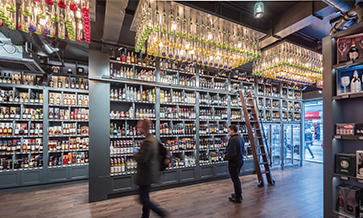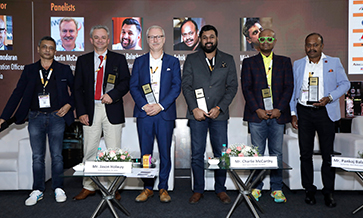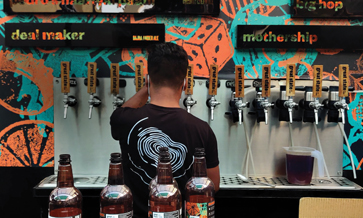The nationwide lockdown due to the Covid-19 pandemic has drastically impacted the business of imported alcoholic beverages. Due to advertising restrictions in the trade, we largely rely on brand building through the hotels, restaurants and catering (HoReCa) channel. A large part of our business comes from this channel.
Due to high taxation on imported alcoholic beverages the volume of the category overall is less than 3% of the total alcoholic beverages consumed in India. High price due to taxes and distribution bottlenecks restricts the growth of imported brands.
Due to advertising restrictions, we invest heavily on product trial at on-premise outlets. This business segment will take at least couple of quarters to stabilize.
However, as and when the HoReCa channel reopens, we expect a strong recovery in sales. Some states will take a lead to open this segment faster, so we will direct our focus and efforts accordingly.
The ‘Vocal for Local’ emphasis will impact imported brands so far as institutional sales are concerned – this channel makes for nearly half of all volume of imported brands.
Testing times
The demand for high-end imported brands has been adversely affected in the post-lockdown phase. We have felt more pain in the premium and super premium wine brands. In comparison, malts and Scotch whisky at premium price points are faring better.
In the imported wine segment there is higher uptake in the price band of up to Rs 3,000; in imported white spirits it is under Rs 3,000; and for Scotch and malts up to Rs 10,000.
Thankfully we had crafted our portfolio to address the larger audience in mind. Thus, we operate in a wider price band and also with diverse product portfolio. We do believe this trend will continue in the coming months.
We have prepared our distribution channel accordingly. We will be looking at very select additions in our portfolio in this year and, rightfully so, the focus will be on value and mid-price variants.
It is very tough for new brands to make inroads into the Indian market due to restrictions on advertising and home deliveries. It was a positive change to see many states allowing home deliveries. I hope this exemption becomes a norm even after the Covid-19 disruption.
Tax travails
Taxation on alcoholic beverages is already among the highest in the world, both by the Centre as well as state governments. Any additional duties, especially in this adverse scenario, will make the imported spirits business even more difficult. Thankfully, some states have heard the plea and withdrawn the additional Covid- 19 surcharge.
Unfortunately, the alcobev industry always ends up getting step motherly treatment from the government. The only benefit we can expect is the generic benefit offered to companies covered under the micro, small and medium enterprise sector.
The disruptions will add the cost burden at all levels whether procurement, logistics or cost of sales; but this will be short-lived. When things return to normal, these costs will go back to the previous normal.
So the choice is with the producer or importer, on whether to take this burden on their balance sheet or pass it on. I believe, considering the current scenario, a majority will absorb this incremental burden.
Overall the business in this year will be tough. Normalcy will depend upon how quickly the Covid-19 pandemic is controlled and we find an effective vaccine or medication to treat those affected.
Irrespective of the timeline, next two quarters are still going to be challenging. On-premise channel will take a bigger hit and a longer graph to recover; which will make the imported wines and spirits business a lot slower and tougher.
Changing goalposts
Even with the partial opening up of the economy, a majority of states have only permitted the retail channel to function. The consumption pattern has shifted towards value brands; and consumption is happening at home.
Availability of brands has been another challenge and consumers in many markets have been pushed to shift brands and even product category. I believe the situation could be transitory for wines; but usually you will always find loyal consumers coming back to their own brands.
However, there could be possibility of consumers sticking to the new brands if they find them more appealing, value driven or closer to their taste profile. It will not be wrong to conclude that such experimentation probably would not have happened during the normal scenario for a majority of consumers.
Ready-to-drink and low-alcohol beverages are trendy and gaining popularity in many international markets. Even though RTD category is still small in India and largely dominated by a single brand, there is immense potential in this category.
Cocktails, mixers and home-brewing are other emerging trends among the urban population and would continue to grow.
Industry support
The lockdowns have impacted the employment level in the hospitality industry drastically. Spirits producers and importers must help them in these difficult times by extending a helping hand of support.
VBev has pledged to support one such initiative by the India Flair Bartending Association for their ‘Support for Bartenders and Hospitality Professionals’ campaign.
Special times need special measures. It is important to stay positive and safe. The impact of Covid-19 will stay for long and we will need to adapt to survive and manage business around this new normal.
Some of the key learning for business leaders from this crisis would include a) Out-of-box thinking to find new revenue streams; b) Prudent finance and resource management to keep afloat; c) Openness to change; and d) Quick realignment of product offers and resources to adapt to the new market environment.













